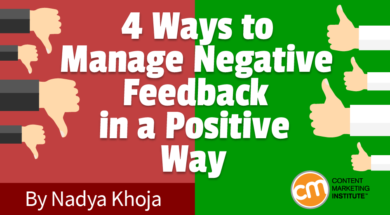An angry reader rants in a comment. My team and I talked to over 50 marketing influencers who set themselves up for potentially negative feedback by speaking or publishing for an audience. “There are people out there who will always see the negative, and only the negative,” she says. As a result, you can look at the feedback two ways: (1) confirmation that you do, in fact, suck or (2) an opportunity to ask yourself how you can improve. “If your mindset and your desire is to be improved, then you will remain open to all forms of constructive critique because you will always be welcoming and processing for information to grow or to better yourself, your product, or your service.” Criticism can be invaluable to your personal and professional growth. Hear it Just because someone has something bad to say doesn’t mean you need to accept it as truth. You can choose to listen and acknowledge people who share their thoughts without agreeing with them. A lot of the time, people just want to know that they have been heard. What he didn’t do was take the feedback personally. Want to be part of a community focused on positive ways and constructive critical ideas to improve your content marketing programs?

As marketers we often face rejection and negativity. An idea is shot down. An angry reader rants in a comment. A prospect chooses a competitor’s product.
We can’t help but feel a bit of a sting when someone spits on our hard work. How do we stay strong and steadfast in our commitment to succeeding in our content marketing efforts? It’s not always easy.
My team and I talked to over 50 marketing influencers who set themselves up for potentially negative feedback by speaking or publishing for an audience. I compiled these four recurring tips to help us overcome unfortunate real-life and internet negativity.
1. Learn from it
The most common suggestion shared by experts was to learn from the negative feedback.
Jen Spencer, vice president of sales and marketing at Allbound, suggests first identifying whether the feedback is useful or if it’s garbage. “There are people out there who will always see the negative, and only the negative,” she says.
As a result, you can look at the feedback two ways: (1) confirmation that you do, in fact, suck or (2) an opportunity to ask yourself how you can improve.
It all comes down to your mindset. Do you accept what you’re told as is? Or do you persevere and find a way to turn that negative perspective around?
Doug Kessler, co-founder of Velocity Partners, says receiving negative feedback with open ears is an important part of being a marketer: “The only real response you need to make is ‘thanks’ – and then to try to take on board what the person said and how it can help you.”
The truth is not everything you say or create will be widely accepted and loved. There will always be differences of opinion.
Vera Jones, president of Vera’s Voice Works, really hits that nail on the head when she says:
“Your focus should not be about being approved, but rather being improved! True winners are always looking for ways to get better. Seeking to be approved involves a lot of unstable emotion. Seeking to be improved involves a lot of stable evaluation.
“If your mindset and your desire is to be improved, then you will remain open to all forms of constructive critique because you will always be welcoming and processing for information to grow or to better yourself, your product, or your service.”
Criticism can be invaluable to your personal and professional growth. The trick is to be able to assess where that feedback is coming from, reflect, and then react, rather than jump the gun and get defensive immediately.
2. Ignore it
Of course, feedback also comes from sources that do not have the same level of experience as you do. Many people tell you what you should do without saying anything of value.
According to a study in Psychology Today, most hateful banter comes from online trolls. What fuels these individuals to be so vocal on the internet is the mask of anonymity, also referred to as the…

COMMENTS